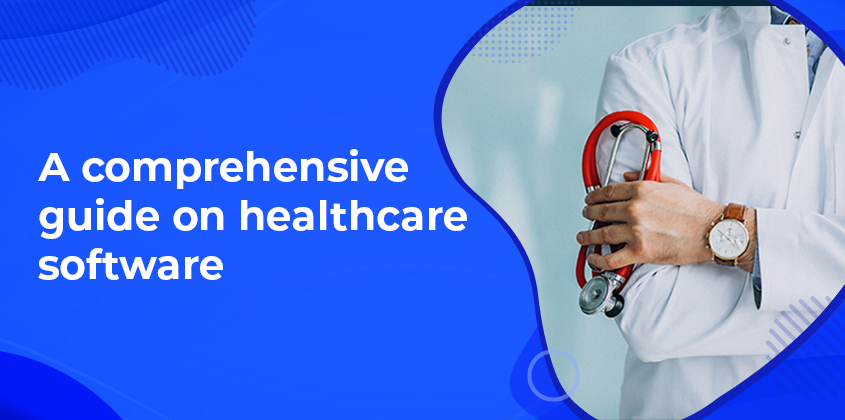Your Comprehensive Guide to Healthcare Software Development

Healthcare software organizes and completes many daily interactions and administrative chores between patients, doctors, and administrators. Therefore, these systems streamline contacts, improve care, and ensure privacy and accuracy in hospitals, clinics, research labs, financial service offices, and medical equipment providers. Healthcare software development has become essential for improving patient care, administrative operations, and system efficiency.
According to a report by Mordor Intelligence, the Healthcare IT Market is estimated to be worth USD 358.5 billion by 2024. Thus, custom Healthcare software development creates an ecosystem that improves quality and accuracy. Automating patient records and diagnosing ailments are among the benefits of machine learning-accelerated healthcare software development. Big Data and e-health have also transformed healthcare software development.
Importance of Software in Healthcare Systems
Customized healtcare software simplifies the maintenance and operation of expensive assets. Medical establishments can optimize inventory stocking and save operational expenses using cutting-edge IT systems.
Patient satisfaction depends on characteristics like fast access to treatment records and medical annals. Automated scheduling, integrated communication networks, and in-app notifications and messaging speed up the process, satisfying customers! Healthcare software lets doctors remotely watch patients. Therefore, Patients can rapidly consult and get diagnosed without seeing a doctor.
Healthcare software includes clinical decision support tools that help medical professionals diagnose disease, prescribe medication, and develop treatment plans based on guidelines that have been shown to work for specific patients. Thus, clinical decision support systems reduce errors in medical practice, improve patient safety, and enhance care quality.
Through patient portals, mobile apps, and wearable devices; software allows patients access to educational resources/self-management tools/personalized health information. Patient engagement software improves literacy on health issues, leading to shared decision-making and increased patient satisfaction as well as outcomes on the other side.
Types of Healthcare Software Development
Healthcare software development plays a vital role in modern medical facilities, streamlining clinical workflows, optimizing operations, and ultimately improving patient care. This technology encompasses a vast array of tools that address various aspects of healthcare delivery, from managing medical records and scheduling appointments to handling finances and ensuring accurate diagnoses. Let’s delve deeper into some of the most prominent types of healthcare software development:
1. Electronic Health Record Software
The design permits electronic patient data management. Allergic reactions, lab results, patient medical history, and demographics are maintained. The integration of EHR with a healthcare ERP system expands the capabilities of any healthcare facility.
2. E-Prescription Software
Technological advances allow immediate prescription delivery to pharmacies. It improves patient comfort and healthcare industry linkages. This centralized repository allows authorized healthcare professionals to access a patient’s complete medical picture in real-time, facilitating informed decision-making and improved continuity of care.
3. Urgent care
Many apps in this healthcare software category enable patients to seek emergency help without seeing a doctor. These user-friendly applications allow patients to virtually connect with healthcare professionals for consultations, symptom assessments, and treatment recommendations.
4. Hospital Management Software
These technologies improve hospital management. These solutions help with billing, insurance, patient data, and administration. These comprehensive solutions encompass features for managing patient admissions, scheduling appointments, billing and insurance processing, maintaining electronic medical records, and handling administrative tasks.
5. Healthcare CRM
This software manages customers. Better client relations—care quality, contact management, and accurate performance reports—are the primary goals. This software empowers healthcare providers to personalize care plans, improve communication with patients, and generate reports to assess the quality of care delivered.
6. Telemedicine Software
With this program, doctors, therapists, and psychiatrists can remotely assess and diagnose patients utilizing video conferencing and file-sharing. Telemedicine expands access to specialized care, improves healthcare delivery efficiency, and promotes patient convenience.
7. Laboratory Information Management Systems
A LIMS manages samples, collects data, automates procedures, and integrates devices to improve lab results. It acts as the central nervous system for a laboratory and goes beyond simply storing data which actively manages samples throughout their lifecycle, from initial collection and registration to analysis and reporting.
8. Radiology Information Systems
Track patients, photos, appointments, findings, and invoices with this medical imaging software. RIS systems increase radiology patient care and diagnosis speed and quality.
9. Pharmacy Management Systems
Pharmacy management systems monitor expired drugs, reorder stock, send SMS reminders to patients, store and backup customer data, and perform other valuable activities to maintain a safe and well-run pharmacy.
10. Health Information Exchange Software
HIE software lets medical staff safely and swiftly communicate patients’ private health information with other organizations, improving care speed, efficiency, and reliability.
11. Software for billing and revenue cycle management
This software is designed to track billing and revenue throughout a patient’s life cycle, showing each customer’s treatment cost.
What Do Healthcare Software Development Companies Do?
As the rapid tech transformation of healthcare sector, healthcare software development company offer innovative solutions that simplifies their routine tasks and help them to perform complex surgeries.
Custom healthcare development company are engaged in creating robust solutions that not only provide better care, but also eliminates human errors to deliver precise and personalized care for every patient.
Healthcare software development companies specialize in the creation of customer-centered software applications for healthcare stakeholders, including care providers, patients, and others. This is an outline of what these firms typically do:
- Custom Software Development: Custom healthcare software development companies come up with tailor-made solutions to meet unique challenges affecting health organizations. These could include electronic medical records (EMR) systems, practice management systems (PMS), telemedicine platforms, and patient engagement applications.
- Mobile App Development: Because of the increased usage of smartphones and tablets in healthcare settings, mobile apps are being developed by software development companies for both patients as well as health care providers. These apps may be telehealth apps, medication adherence tools, appointment scheduling apps, or fitness/wellness applications.
- Integration Services: Often, healthcare systems consist of different standalone systems and technologies. To ensure a seamless flow of data across various devices, databases, and software platforms, healthcare software development companies offer integration services that connect them.
What’s the Future of Development in Healthcare?
A study predicts a significant change in healthcare software development. Open, secure systems, customer-driven care, and easy data sharing will dominate. The global market for big data analytics in healthcare is anticipated to expand at a compound annual growth rate (CAGR) of 19.2%.
Thus, healthcare software development increases the human-centric approach to healthcare by linking many solutions, such as treatment plan optimization, health progress tracking, and online expert consultations. It also improves brand management, reputation, and service delivery for businesses.
The key trends of software development in medical fields are:
- Emphasize self-care and online communication, mainly through a patient portal. Accessibility and usability should be prioritized. Address demographic demands, such as neurodivergent people.
- Blockchain innovation involvement significantly democratizes sectors. Blockchain securely reveals internal operations, making the exchange more trustworthy and collaborative.
- Expanded EMR software will link all specializations in the future.
- Artificial Intelligence can customize treatment and make more precise diagnoses.
- VR/AR has many uses, including medical training and patient education.
Healthcare IT solutions have promising prospects, but we still have a long way to go. Safety is one of the biggest challenges for modern digital solutions. Thus, new software should be prioritized.
Conclusion
Healthcare software development is transforming patient care, operational efficiency, and clinical decision-making. From electronic health records to telemedicine platforms, healthcare software has several uses. Healthcare software development will shape healthcare delivery as technology and demand change. Finally, Healthcare software development company like Peerbits take on this role of helping healthcare organizations succeed in a dynamic healthcare context by utilizing innovations, encouraging partnerships, and giving user-centric design priority.








